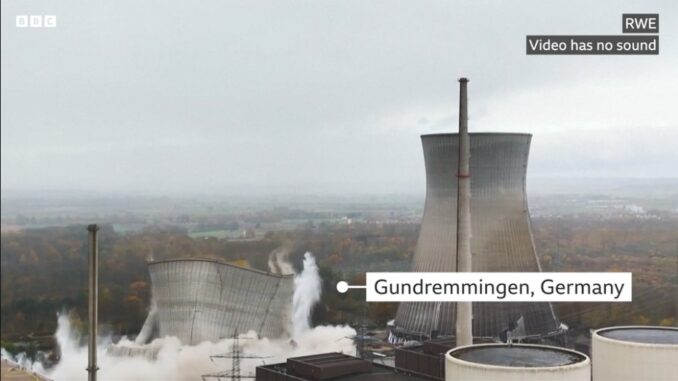
In a spectacle that could only be described as self-inflicted pyrotechnics, Germany detonated the final two cooling towers of its last operational nuclear power plant in Gundremmingen, Bavaria, on October 25, 2025. At precisely noon, under a drizzly sky that seemed to mirror the nation’s darkening economic prospects, 56,000 tonnes of concrete crumbled in a controlled blast, erasing yet another symbol of reliable, low-emission energy from Europe’s industrial powerhouse.
This demolition at the Gundremmingen B site isn’t just the end of a chapter—it’s the punctuation on a decades-long saga of ideological zeal that has left Germany’s economy in tatters, its factories shuttered, and its workers scrambling for jobs that no longer exist.For those unfamiliar with Germany’s nuclear odyssey, the phaseout was set in motion after the 2011 Fukushima disaster in Japan. Despite no direct threat to German soil, politicians from nearly every major party—save the far-left—rushed to shutter the country’s reactors, which at their peak supplied around 30% of the nation’s gross electricity production by the turn of the millennium.
The last three plants went offline in April 2023, and now, with Gundremmingen’s towers reduced to rubble, the dismantling marathon continues, projected to drag on until 2040.
Proponents hailed nuclear as a “bridge technology” toward renewables, but critics—and increasingly, economists—see it for what it was: the cleanest, most dispatchable baseload power source on the planet, sacrificed on the altar of green dogma.
In Germany, two cooling towers at the former Gundremmingen nuclear power plant were demolished, almost four years after the last reactor was shut down. Thousands came to watch the spectacle, according to the police. pic.twitter.com/Lqh2vaQNqa
— DW News (@dwnews) October 26, 2025
Enter the Energiewende, Germany’s vaunted “energy transition” under Net Zero policies, which promised a utopia of windmills and solar panels powering a de-carbonized future. Instead, it’s delivered a dystopia of soaring energy prices, grid instability, and a deindustrialization wave that’s accelerating faster than a Tesla on autopilot. By ditching nuclear—the very epitome of zero-emission reliability—Germany has amplified the intermittency woes of renewables, forcing reliance on expensive gas backups and imports. The result? Electricity costs for industrial users now average 20.3 euro cents per kilowatt-hour, more than double the 8.4 cents in competitors like the U.S. and China.
Germany saving the climate after blowing up its perfectly fine nuclear power plants. pic.twitter.com/M9I7wCm3K0
— Michael A. Arouet (@MichaelAArouet) October 27, 2025
This isn’t just inefficiency; it’s economic suicide
.The fallout is etched in the numbers, painting a grim portrait of a manufacturing giant reduced to a shadow of itself. Since 2019, German industry has hemorrhaged nearly 250,000 jobs, with 101,000 vanishing in the first year of 2025 alone.
Over six years, the tally climbs to 245,500 lost positions, as exports to key markets like the U.S. and China crater under tariffs and competition.
In 2024, the sector axed another 68,000 roles, and the bleeding shows no signs of stopping.
Even more stark: a 21% plunge in overall output directly attributed to Net Zero’s energy straitjacket, turning what was once Europe’s export engine into a sputtering relic.
|
Metric
|
Pre-Net Zero Peak (circa 2019)
|
2025 Status
|
Decline
|
|---|---|---|---|
|
Industrial Jobs
|
~8.5 million
|
~8.25 million
|
-250,000 (-2.9%) energynewsbeat.co
|
|
Annual Job Losses
|
Minimal
|
101,000 (2025 YTD)
|
N/A energynewsbeat.co
|
|
Industrial Output
|
Stable growth
|
-4.3% (Aug 2025)
|
Sharp contraction reuters.com
|
|
Automotive Production
|
Robust
|
-18.5% (Aug 2025)
|
Sector in freefall reuters.com
|
|
Overall Output Collapse
|
N/A
|
-21% due to Net Zero
|
Catastrophic |
This isn’t abstract data—it’s families shattered and communities hollowed out. Take the automotive behemoths: Volkswagen, Mercedes, and BMW are slashing thousands amid a “jobs massacre” rippling across suppliers.
Porsche alone announced 1,900 layoffs in early 2025 as job guarantees expired, while porcelain giant Rosenthal plans to shutter one of its two factories by year’s end, citing unbearable energy costs.
Chemical titan BASF, a symbol of German engineering since 1865, idled multiple units at its Ludwigshafen mega-site, costing 2,500 jobs and closing an ammonia plant outright—blaming the very Net Zero push that jacked up power prices.
U.S.-owned Trinseo followed suit, shuttering a styrene facility in Böhlen and a polycarbonate line in Stade, triggering knock-on closures at partner plants.
Coatings firm Allnex pulled the plug on its Hamburg operations last year. And that’s just the tip: In the first half of 2025, 940 manufacturing firms filed for bankruptcy, part of a staggering 11,900 insolvencies nationwide—a 9.4% spike from 2024.
Last year alone saw 196,100 companies vanish, the highest since the 2011 financial crisis.
Fiscally, the house of cards is tumbling. Germany, the EU’s lone recessionary holdout, has endured two straight years of contraction, with economists forecasting zero growth for 2025—a “period of considerable sluggishness” that dashes any hopes of a quick rebound.
The Green Deal’s regulatory frenzy, coupled with Beijing’s export subsidies flooding markets with cheap EVs and steel, has gutted German competitiveness. Add aging infrastructure—like bridges closed since 2021 with replacements years away—and a bureaucratic morass that’s “turbocharging” nothing but frustration, and you’ve got a recipe for terminal decline.
As one industry leader lamented, the back-and-forth on subsidies for heat pumps and EVs has “put a lot of burden on companies,” derailing net-zero targets while accelerating the exodus.
Germany’s leaders, ensnared in what ZeroHedge calls a “collective psychosis” of eco-socialism, press on with moral superiority, branding dissenters “climate deniers.”
Yet as the world pivots—Asia builds reactors at breakneck speed, and the U.S. eyes quadrupling nuclear capacity by 2050—Berlin isolates itself in degrowth delusion.
The Gundremmingen blast wasn’t just concrete falling; it was the sound of opportunity exploding, jobs evaporating, and a once-mighty economy imploding under the weight of policies that prioritize virtue-signaling over viability.For the rest of the world eyeing Net Zero, Germany’s implosion is a blaring siren: Ditch reliable nuclear at your peril. Rebuild the towers—literal and figurative—before it’s too late. The Energiewende isn’t a transition; it’s a trap. And the rubble from Gundremmingen is proof.
Got Questions on investing in oil and gas?
Crude Oil, LNG, Jet Fuel price quote
ENB Top News
ENB
Energy Dashboard
ENB Podcast
ENB Substack






